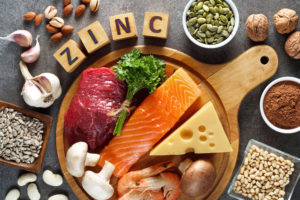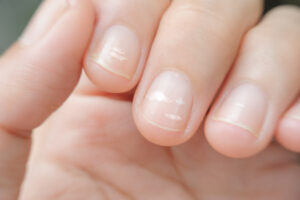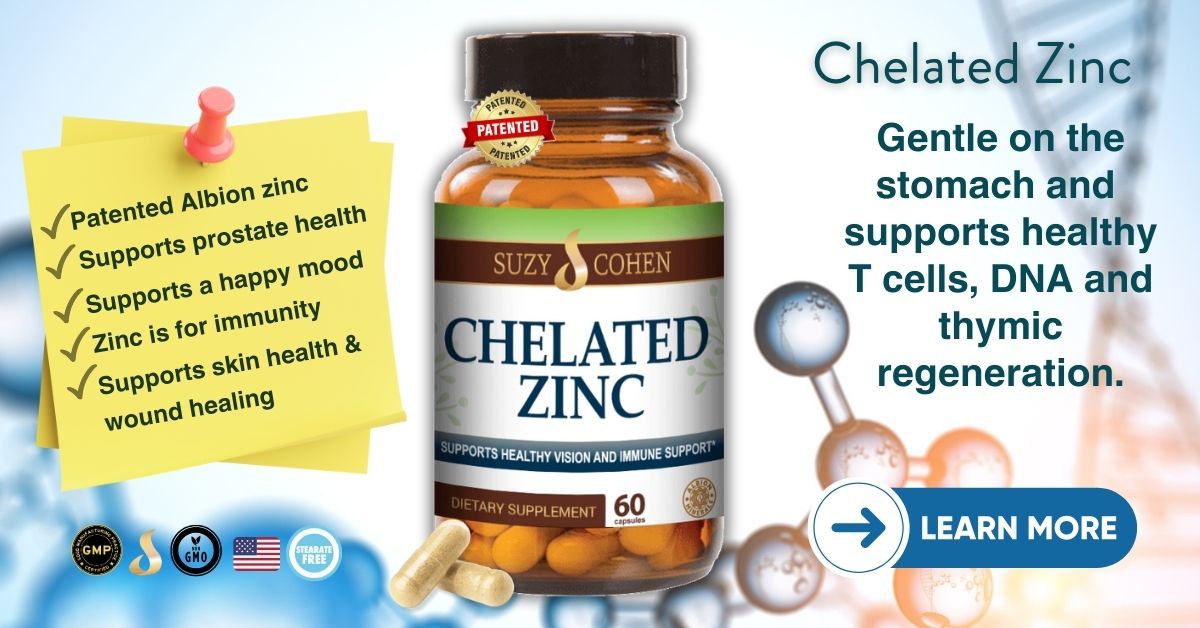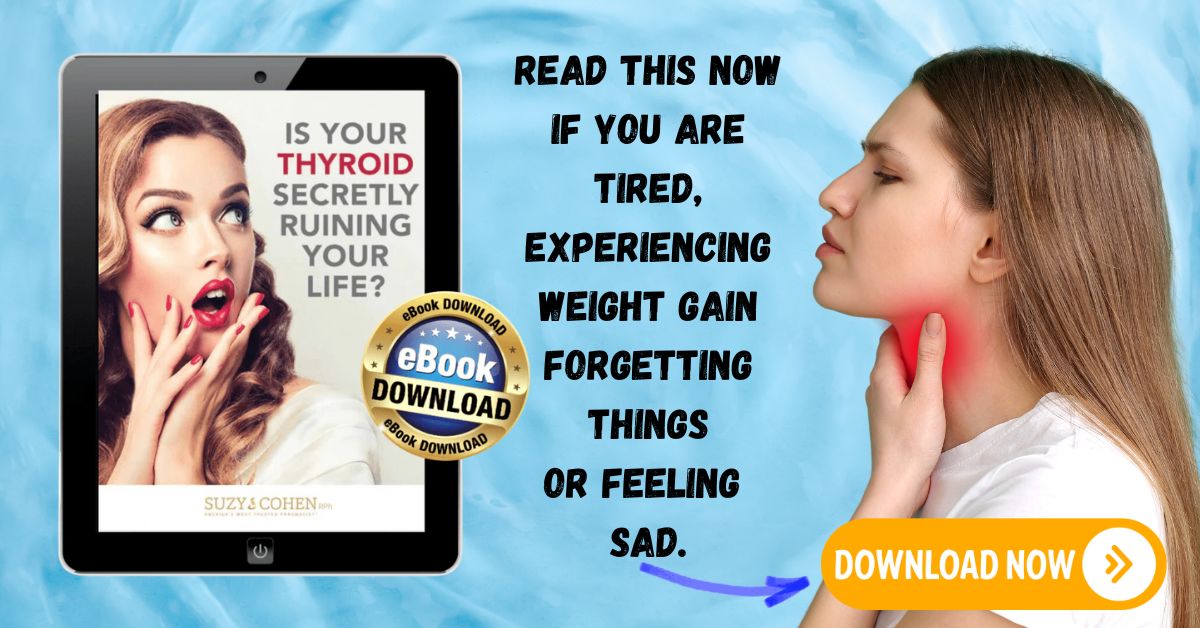What's On This Page?
ToggleZinc is a trace element and precious metal. That means we only require small amounts to reap the benefits it has to offer. Actually, it is the second-most abundant trace mineral in the human body after iron which is the most abundant!
People can run out of this nutrient easily especially if their diet is vegetarian or vegan. Other causes is having sickle cell anemia, gastric surgery, alcoholism, Celiac or Crohn’s disease.
Zinc is necessary, albeit in smaller “trace” quantities, because it assists in about 300 important metabolic pathways, and those affect your health from head to toe!

The powerful antioxidant mineral is found throughout the human body and while we do not naturally store excess zinc, we can obtain the preferred daily amounts of this element through common foods such as red meat, certain shellfish (crab, for example), poultry, dairy products, and whole grains. Foods particularly high in zinc include those shown in the graphic.
If you aren’t one who enjoys eating shellfish, there are some fruits listed below that are great for a smoothie. This would be a nice way to start your day with a burst of energy and flavor. Some of the more delicious smoothie options that contain a trace amount are listed below:
Guava
Cantaloupe
Oranges
Peaches
Watermelon
Colorful berries
Apricot
Pomegranate
An orange contains about 0.17 mg of zinc just FYI. And if you want to get enough of this mineral into your diet, but you don’t want to eat 53 oranges every day (!) supplements are of course an excellent way to get enough into your system. CHELATED ZINC is a great type of supplement because the natural zinc is bound to a natural amino acid, and this is thought to lessen the typical complaint of stomach upset which is very common with minerals.
Zinc is Essential to Human Health
Zinc is necessary, albeit in smaller “trace” quantities, because it assists in important matters such as immune function, thyroid hormone production, weight management, ability to taste, hear and see, and wound healing. It is needed to help your body make specific proteins and keep DNA strands in good shape! That is important because it helps a person recover from a burn, or other wounds even acne.

A deficiency can cause white spots in the nails. Speaking of nails, you might be interested in my other article, 3 Harmful Ingredients In Your Nail Polish.
As Zinc helps with growth and development, it is especially important for children to obtain appropriate levels of Zinc. The Office of Dietary Supplements suggests that people over the age of about 19 years old should consume/intake between 8 and 11 milligrams of zinc each day, give or take. That seems like a low amount, but maybe it is because that amount is designed to keep you from suffering a horrible plight of zinc deficiency. See symptoms below.
To optimize health, you would need more. How much more is really dependent on how much your body has, how you store it, genetic factors, and more.
Studies regarding zinc:
1. Immunity
There are numerous trials on zinc and its role in immunity, especially innate immunity which is our first line of defense. In one intriguing study from 2019, published in the journal, Clinical Infectious Diseases, researchers concluded, “Our results showed that, in COVID-19 patients, oral zinc can decrease 30-day death, ICU admission rate and can shorten symptom duration.”
2. Asthma and Allergies
Just a year after that COVID study, there was another called the Polish Mother and Child study, and its purpose was to determine if prenatal status impacted the immunity of children. The aim was to see what the correlation was of the pregnant mom’s micronutrients for zinc, (and a few other vitamin antioxidants like A, E, D and selenium) to the occurrence of diseases later on in their child’s life.
The diseases of interest were atopic dermatitis (rashes), food sensitivities, sinus problems/allergies, and asthma. As you might have guessed, there is a higher risk and occurrence of childhood disorders if mom’s antioxidant defense system is low.
In September 2022, a paper was published in the International Journal of Environmental Research and Public Health.
The researchers found that children were more susceptible to allergies and asthmatic disease if they did not have adequate amounts of zinc (and copper which stays in balance with zinc). The professors stated, “The levels of Cu and Zn, and poor nutritional status in general, can influence the immune system and may be considered risk factors for developing asthma, allergic rhinitis and food.”
3. Skincare, Acne, Warts, and Rosacea
According to this meta-analysis published in The Journal of Dermatological Treatment Aug 2022), there is a lot of benefit to zinc supplementation.
The scientists conducted a review of many studies to investigate the minerl’s role in skin care and wound healing. They said, “This review has found evidence to support the use of zinc in patients in infectious conditions (leishmaniasis and warts), inflammatory conditions (acne rosacea, hidradenitis suppurativa) and in hair loss disorders. Patients with a deficiency should also receive oral supplementation.”
If you are interested in a high-quality “tummy-loving” ZINC supplement, please visit my vitamin shop. CLICK HERE.
4. Bones and Teeth
It’s well known that zinc works in tandem with other bone-loving minerals like strontium, boron, calcium and vitamin D. We know that low amounts correlate to reduced bone density.
Depending on which doctor you ask, the recommended doses for the treatment and prevention of osteoporosis are somewhere between 15mg to 30mg daily. But what about regenerating bone? It sounds like something out of a sci-fi movie, doesn’t it?!
You might expect a pharma commercial about a drug doing that, not a supplement! But in this fascinating REVIEW PAPER published in 2020, the ability of zinc to literally improve bone regeneration was explored!
5. Prostate Health
While studies do conflict over the past decades, most doctors agree that zinc is useful for prostate function. Some studies have found that it can inhibit certain prostate cancer cell lines and possibly slow metastasis in some patients with prostate cancer (PC). We know that tissue levels of the antioxidant mineral are consistently reduced in specimens taken from PC patients as compared to healthy specimens. But what about testing for PC?
Traditionally, the prostatic specific antigen (PSA) test is used as the gold standard diagnostic tool to test men for PC, but it’s controversial. A lot of men get treatments they don’t need “due to the lack of specificity and high prevalence of over-diagnosis and over-treatments.”
Testing a biomarker like zinc would be such an easy and inexpensive way to evaluate for PC. And exactly that is proposed in this recent PAPER published in the journal called “Cancer” in October 2022.
According to the abstract, “ One of the most consistent characteristics of PCa is the marked decrease in zinc; hence the lost ability to accumulate and secrete the mineral. The researchers suggest that in combination with other standard tests like the PSA, MRIs for example, “urinary zinc may represent an early and non-invasive diagnostic biomarker for prostate cancer.”
6. Thyroid Function
It’s well known that a zinc deficiency contributes to more symptoms of thyroid illness. Low zinc will lead to the development of hypothyroidism and will deplete it faster. Conversely, hypothyroidism can result in a deficiency. There’s more about this connection in my book, Thyroid Healthy.
Studies prove that zinc regulates deiodinase enzymes which help you make thyroid hormone, as well as thyrotropin-releasing hormone (TRH) from the brain, and thyroid stimulating hormone (TSH) from your pituitary gland. Zinc plays a role in transcription factors regrind your DNA that controls thyroid hormone. All of this means it plays a big role in several major thyroid-related pathways.
Can You Take Too Much?
Yes, the body has to stay in balance. Megadoses of vitamins and minerals are never something I recommend. To be clear, zinc is incredibly beneficial when taken in appropriate amounts, but excessive amounts can cause health problems. Side effects of overdoing it can cause stomach cramps, loose boys, headaches, nausea, and vomiting. There may be a significant loss of appetite and subsequent weight loss.
Even though it is required for healthy immune function, and fighting off certain viruses, taking too much can backfire and weaken immunity.
On the other side of that same coin, overindulging in zinc for extended periods of time can lower HDL cholesterol as well as copper levels. To learn more about copper, read my article entitled My 2 Centas About Copper Worth a Million Bucks.
Don’t be deterred – Zinc is Your Friend!
The antioxidant mineral has immense health benefits when portioned properly. A little bit goes a long way with this nutrient. Dosages range, but 20 mg per day is probably a safe bet unless you experience some of the issues noted above. Many people with auditory dysfunction and visual deficits find that 40 mg per day is better for them. And higher doses are also indicated for people with prostate enlargement, and fertility issues, especially if it’s related to low sperm count or motility.
What Can Cause a Zinc Deficiency?
So many things can reduce levels in the human body. Here are just a few situations that may lead to deficiency:
- Use of acid blockers or heartburn medication via the drug mugging effect
- Gastric bypass surgery
- Crohn’s disease or ulcerative colitis
- Excessive intake of copper supplements
- Chronic kidney disease
- Liver disease
- Older age
- Poor nutritional status
- Thyroid disorders
- Being a vegetarian or vegan
Signs and Symptoms of Deficiency
Hair loss
Loss of appetite
Feeling irritable
Slow wound healing
Lack of taste
Lack of smell
Impotence
Diarrhea
Can Pregnant Women Take it?
Yes, an OB/GYN often orders some multivitamins with zinc for pregnant women. Sometimes a stand-alone zinc supplement is needed. Women tend to focus only on folate during pregnancy, but they should definitely pay close attention to their zinc (and iodine) levels! This is because their developing baby will need these minerals for proper growth, reproductive organ development, and cognitive function. In case you’re wondering infants obtain the mineral easily through breastfeeding, supplementation is not needed.

Suzy Cohen, has been a licensed pharmacist for over 30 years and believes the best approach to chronic illness is a combination of natural medicine and conventional. She founded her own dietary supplement company specializing in custom-formulas, some of which have patents. With a special focus on functional medicine, thyroid health and drug nutrient depletion, Suzy is the author of several related books including Thyroid Healthy, Drug Muggers, Diabetes Without Drugs, and a nationally syndicated column.


